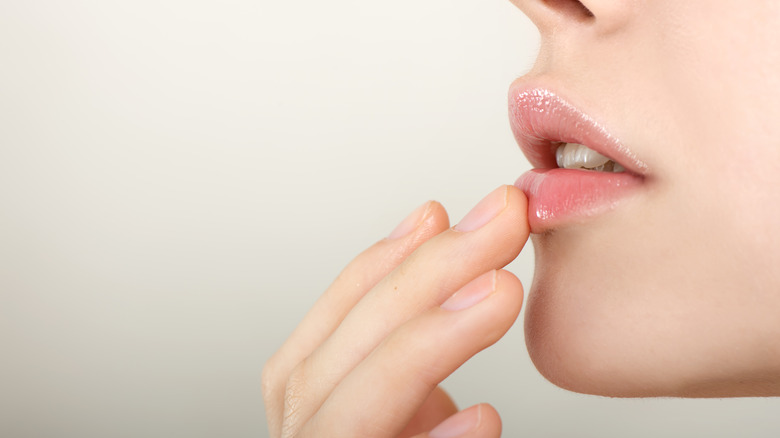Here's Why Your Lip Is Twitching
Any muscle twitch can be hard to ignore, but especially so when it's on your face. Aside from your eyes, twitches in your lips are one of the most common involuntary movements to experience. Figuring out exactly why your lip is twitching isn't an easy task, as there are multiple factors that cause it in the first place. But if you take your eating and drinking habits into account, as well as your general health, you'll can start to figure out why your lip is slightly spasming.
While lip twitching can be a small symptom of more serious conditions like Parkinson's disease or ALS, according to Healthline, most likely, there is no need to panic if you notice your lip quivering every so often. In fact, a lip twitch is more often than not a result of everyday things that you can fix with some important tweaks in your healthcare routine. Even if the twitch is caused by a medical reason, which is possible, it most likely won't be permanent — and here's how you can fix it.
Lip twitches can be caused by stress, mineral deficiencies, and medical conditions
According to Medical News Today, lip twitches can be explained away simply by drinking too much caffeine. Like any other muscle twitches, stress and anxiety can be culprits too. This is due to the amount of tension being put on your muscles and nerves, as well as adrenaline rushes, per Calm Clinic.
Aside from your mental health and a caffeine-heavy diet, a twitch in your lip can also be a result of certain deficiencies. Medical News Today notes that low potassium is often a common cause for twitches, which can cause spasms and cramps in any muscle including the lips.
There are also particular medical conditions that effect the muscles in the face, including Bell's palsy and hemifacial spasms. Bell's palsy is categorized as a sudden weakness in facial muscles according to the Mayo Clinic, where its believed swelling and inflammation can cause one side of your face to droop. For most, the condition is temporary and can improve after a few weeks. But some may continue to have symptoms for the rest of their life.
A hemifacial spasm, on the other hand, is a chronic condition that causes involuntary face twitching due to "compressed facial nerves," per Cleveland Clinic. While there's no cure for this, symptoms can be eased by taking it easy (like getting enough sleep and lowering stress), as well as through medication, injections, or surgery.

